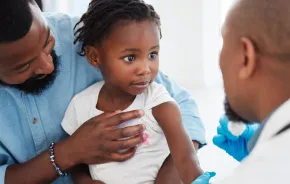
One of our most important endeavors as parents is helping our children to grow into capable, independent members of society, but we often unintentionally thwart their progress. Admittedly, it’s tough to watch our kids struggle when the going gets tough, but allowing them to find their own solutions stimulates their growth into fully competent individuals. Instead of swooping in to save the day, help your kiddos develop the coping skills they need to weather life’s storms on their own. Adversity ripens resilience, and self-sufficiency is priceless. Read on for our experts’ take on interpersonal and practical life skills all kids need to master, and the actionable ways parents can guide and support their development at each age and stage.
Support emotional literacy and foster independence
In order for children to become autonomous individuals, they must be able to effectively self-regulate. Parents can encourage growth and individuation by being supportive guides throughout the course of their child’s development, allowing the child the freedom and space to work through hard times.
“We want the world to be big, even if it’s uncomfortable, as opposed to small and comfortable,” says Karen Pavlidis, Ph.D., a Seattle-area child psychologist and founder of Child and Teen Solutions. “Difficult feelings are a universal part of being a human, and it’s not the feelings that are the problem. The actions that we use to manage them, the various forms of escaping, are what create the problem,” says Pavlidis.
Toddlers
With toddlers, predictability is key. Establishing a regular routine early on lays the groundwork for emotional regulation later in life. To nurture emotional development, be attuned to your little one, reading their cues and responding appropriately. “A lot of parents do this intuitively. They naturally mirror what their toddler’s emotions are showing, attend to their basic needs and help them stay regulated throughout the day,” says Pavlidis.
After age 3, it’s wise to set clear, intentional limits, using mild discipline strategies, including well-implemented time-outs. “A time-out is one of the best strategies for helping preschoolers develop self-regulation — it prevents [parents] from accidentally reinforcing aggressive behavior with attention. A lot of times when kids strike out, they get a lot of attention for it, and that could actually make it happen more. A time-out teaches [kids] there’s a line and a limit; it’s predictable and reasonable. The internalization of rules and limits helps kids build self-regulation,” says Pavlidis.
Elementary-school-age kids
When tough emotions come up, help your kid learn to identify and process them. “Teach your kids not just about being angry, sad, excited and frustrated, but also about embarrassment and shame,” advises Pavlidis.
As parents, we may feel that it is our job to fix difficult emotions. “That gets really tricky, because then kids get the message that they’re supposed to be happy all the time. Just sit with a child through a dark emotion and give them words for their internal experience without doing anything more than that,” says Pavlidis. “For example, if a child says, ‘I hate myself,’ I think most parents want to say, ‘Don’t think such a thing. We love you. You’re so smart,’ and that actually doesn’t help them. They can feel dismissed and get the message it’s not okay to feel dark emotions. It can actually be more effective to say something like, ‘I think you’re letting me know that’s a really painful thing to feel’ or ‘I think you’re telling me that shame is showing up.’ [Providing] connection in those darker moments can be really powerful and help a child ultimately self-regulate,” says Pavlidis.
Tweens
Once they’re in middle school, encourage kids to develop a discipline, though without pushing them to participate in activities they don’t enjoy. Developing an interest requires dedication and nurtures motivation and self-direction. “Whether it’s martial arts, dance, a musical instrument or a sports team, it teaches them to self-regulate and self-manage, have self-discipline, and hang in there through frustration and when the going gets tough,” says Pavlidis.
“It’s nice when kids have different sources of peer groups, so maybe they have school friends, neighborhood friends and friends from their activities. It’s a more resilient setup for a child if one area isn’t going as well — they still have these other areas of relationships.”
Teens
As kids become teenagers and develop their own beliefs, it’s helpful to adopt a more democratic parenting style, Pavlidis says. Being open-minded and listening to your teen’s perspective allows them to appreciate their worth and instills empathy.
“Parents should show they value their teen’s voice, their opinions and their feelings. Give [teens] the message that their individuality is respected even if they might have different views [from your own]. If we treat our kids that way, they internalize how to treat others. It’s not by lecturing about it, but by living those values, paying attention and making space for their internal world,” says Pavlidis.
Help kids forge and manage friendships to set the stage for positive relationships
Being a good friend is an important life skill to develop; close relationships make us happier and more successful in life. From toddler to teen, an increasing ability to understand someone else’s perspective fuels the development of more intimate, long-lasting friendships, says Eileen Kennedy-Moore, Ph.D., a Princeton, New Jersey, psychologist and co-author of “Growing Friendships: A Kids’ Guide to Making and Keeping Friends.”
“Friendships make the good times more enjoyable and the hard times more bearable — they’re kind of the answer to everything. If you want a kid to be motivated to go to school, help them have friends. If you want them to deal better with stressful situations, help them have friends. If you want them to feel happier, help them have friends,” says Kennedy-Moore.
Toddlers
There are a few components to practicing kindness for very young children. “First, they need to be able to manage their own distress. A kid who is overwhelmed by their own emotions is not going to be able to respond in a kind way to someone else, so learning to self-soothe is crucial. Second, they need to be able to understand someone else’s feelings. Third is realizing they are capable of helping the other person,” says Kennedy-Moore.
To assist kids with self-soothing, Kennedy-Moore says, parents should practice empathy when kids are upset. “With little ones, you might want to rub their back, help them move away from the situation, or gently put a hand on their chest and let them calm down so they know you’re there. Then you acknowledge their feelings.”
If another child is upset, we can nudge our child to help out. “You can say things like, ‘Jeffrey is upset because his blocks are knocked down.’ Then you ask the most wonderful question, ‘What can you do to help him feel better?’ This lets the kid respond in a kind way,” says Kennedy-Moore.
Elementary-school-age kids
Kids in this age group are learning how to manage conflict and understand the perspectives of others.
“In the elementary school years, kids don’t know how to solve things, and they resort to just being mean. When conflict arises, you might teach [kids] to say, ‘This isn’t fun for me. I’d like a turn being the cat,’ or whatever the game is, and also kind of a judicious withdrawal if the friend is being consistently unfair,” says Kennedy-Moore. “Elementary school kids are very concerned about fairness, but they’re mostly concerned about fairness to themselves. We can prompt them about what would be fair to everyone, and that can sometimes temper their natural desire to have things their way,” says Kennedy-Moore.
Forgiveness is also important to learn at this age. “Some children will collect grievances like beads on a string, and they will keep track of every mean thing that anybody has ever done. Teach them that if it wasn’t deliberate, if it is not likely to happen again, if it happened more than a month ago or if the person is very sorry, let it go.”
Tweens
As kids mature during adolescence, they gain a broader perspective and develop deeper friendships. Parents should be fully supportive of these peer connections. “At this age, [kids] will do kind things for each other without as much keeping score as younger kids do. They really care about each other, and this is when we get those ‘joined at the hip’ friendships, the deep friendships,” says Kennedy-Moore.
“Connection is so important, and we want to create opportunities for kids of all ages to have friends. First is through activities: Kids make friends by doing fun things together. Second, prioritize friendship. We’ve all got too much going on, but find ways to make time for your child to get together with other kids. One-on-one get-togethers are the single best thing parents can orchestrate to deepen children’s friendships,” says Kennedy-Moore.
Teens
Teenagers want to be autonomous, and parents should be open to their friends, never critical, says Kennedy-Moore. “With teens, it’s asking questions more than giving answers. If you’re concerned that they’re hanging out with a mean friend, ask your kid how they feel when they’re with that [person]. Belittling the friend is not going to be helpful, and it’s kind of insulting their taste in friends. A big part of their identity is: Am I someone who belongs? Am I liked by my peers? Do I feel connected?”
By supporting our teen’s friendships, we are supporting their growth as individuals.
Promote practical life skills to develop self-sufficiency and competency
By the time our kids are ready to fly the coop, we’ll have taught them countless practical life skills. The more tasks we equip our kids to do on their own, the more empowered and capable they’ll be when it’s time to live independently. Even at an early age, our children can develop many life skills on their own, if we’re willing to give them the opportunity and plenty of guidance.
On the road to self-reliance, kids of all ages should know how to ask for help, says Catherine Pearlman, Ph.D., LCSW, founder of The Family Coach and author of “Ignore It! How Selectively Looking the Other Way Can Decrease Behavioral Problems and Increase Parenting Satisfaction.” “There will always be a situation where you don’t know how to do something or there is an emergency. Being able to ask for help will become vital to doing a good job, getting a good grade or saving someone’s life,” says Pearlman.
Toddlers
Parents can begin to prepare their children for independence at a young age. While toddlers will need help doing most things, parents should encourage them to be self-sufficient in every way they’re able. Teaching littles how to take care of their own body is a good place to start. They can learn to brush their teeth, wash their hands and dress themselves. Allowing toddlers to feed themselves helps develop fine motor skills, and straightening up their play area teaches spatial relations and a sense of organization, Pearlman says. “Most skills at this age should be taught to foster the child’s independence. Mastering these basic skills builds confidence as well as skills that can be used to scaffold more difficult skills.”
It’s important they know how to pull their pants up and down and how to put on their underwear; being able to go potty is a huge developmental skill, and it’s required to attend school.
Elementary-school-age kids
At this stage, kids can begin to engage in more complicated tasks. Assigning them specific jobs boosts their intrinsic motivation. Giving your child daily chores, such as feeding the dog or putting the dishes away, may seem small in scale, but such mundane tasks boost their self-confidence in a major way. Whatever responsibilities they’re given, make sure you allow them to complete their jobs (don’t do them yourself instead).
Kids can be responsible for emptying the dishwasher, setting the table, taking care of a minor wound and light cleaning tasks, such as dusting or wiping down the table after dinner. Pearlman suggests teaching children basic cooking tasks, such as making cereal, toast or pasta (with supervision). It’s a good time for parents to teach children how, and why, to write a thank-you note. “A handwritten note helps with penmanship, learning letter format, writing and gratitude,” says Pearlman.
Tweens
A child’s responsibilities should increase in proportion to their age. The less control parents exert over their tween’s day-to-day functioning, the better. Show confidence in your tween’s abilities and help them discover the pride of ownership.
“At this stage, kids are doing skills that help prepare them for the teen years with increased independence,” says Pearlman. Good things for tweens to learn are doing their own laundry, practicing more advanced cooking skills, such as baking and following a basic recipe, and loading the dishwasher on their own, she suggests.
Tweens can become proficient at meal planning; grocery shopping and comparing prices; budgeting; folding, ironing and hanging their clothes; and budgeting skills, such as saving and managing money. They can take charge of cleaning their own living space as well as designated areas of the family home, help with yard work and learn how to use basic tools.
Teens
As children move closer to adulthood, they become more capable in all aspects of life.
“Life skills for teens should focus on preparing them for independent living away from their parents. Many parents continue to help teens do tasks because at this stage they want to feel needed. That’s a mistake, because it holds teens back from gaining confidence to be out on their own and be successful,” says Pearlman.
Young adults should be able to fill out their own paperwork, make a doctor’s appointment and even get a job, says Pearlman. It’s a good time to advance money-management skills, such as opening a bank account, learning how to cash a check and spending money conscientiously. Up the ante in the kitchen: Teens should be able to cook a basic meal, such as pasta dishes or casseroles. They should know exactly how to handle an emergency situation, medical or otherwise. If they’re driving, they should understand the basics of car maintenance, such as how to check the oil and where the spare tire is located, as well as what to do if an accident or breakdown occurs.
It can be challenging to let go of the reins, but we must allow our children to exercise a healthy degree of control over their own lives. Instead of micromanaging every aspect of our children’s routine, we must encourage them to explore their interests and blossom into self-sufficient adults, offering our love and support along the way.











